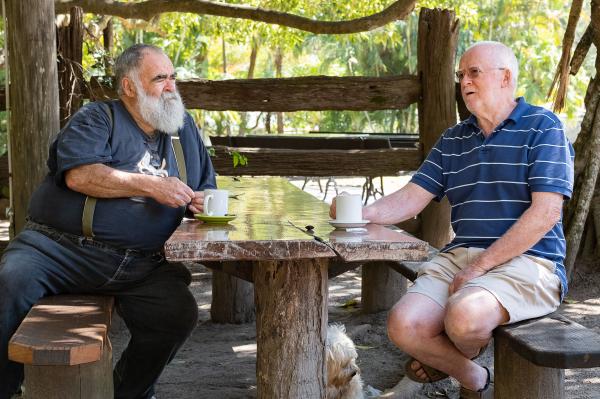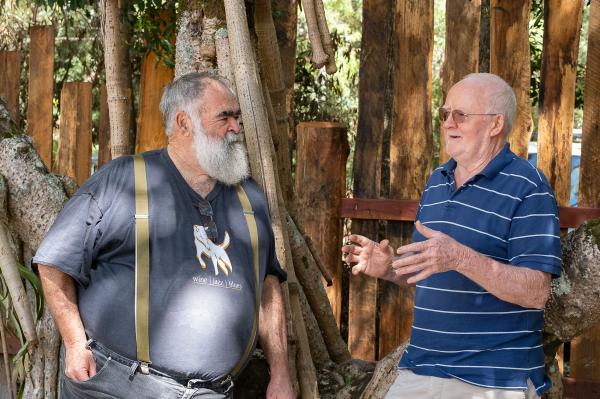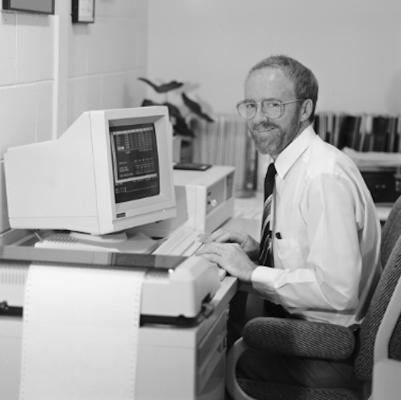Together, Noel Playford and Bob Abbot have served more than half a century in local government. Together, they stood shoulder to shoulder or back to back and fought off their foes, sometimes training a few blows at each other along the way. Together, they changed Noosa. In the first part of a new series, Phil Jarratt puts the two old warhorses together.
The numbers say a lot, but not all. Fifty-three years is an impressive dig, but in Noosa Council’s 110 years there have been quite a few time-servers whose accomplishments no one remembers. Noosa will never forget Noel and Bob, they made sure of that. Both men were mayors of Noosa for 11 years, and over those two decades, they redefined our community.
The Playford family is settler stock, taking up land in Noosa in the late 1800s, but despite four generations of lineage, strictly speaking Noel is not a local. He was born in Rockhampton during World War II while his father was serving, but he is quick to note that he was back in Noosa before he had a memory. He grew up on a farm at Kin Kin, attended the one-teacher school at Wahpunga, and later Pomona High. He milked cows, picked beans and cut bananas, before going off to college and becoming a maths teacher.
By the time he first ran for council (and failed) in 1980, Noel had been a teacher, a charter pilot, a turf farmer and a cruise boat operator.
Bob Abbot was born in Rylestone, NSW in 1950. When he was six months old the family moved to Brisbane, eventually settling on five acres at Ferny Grove, “where we lived in a shed while Dad started to build a house, which he finished in about 1976!” After high school, Bob completed an electrical trades apprenticeship and began a varied pre-political career.
Concerned that I might have missed some of this in our three-way conversation, Bob messaged me this summary: “Electrician by trade, a musician at heart and a politician by choice, Bob has worked in the construction, hospitality, cotton, mining, shipbuilding, manufacturing, fishing, agricultural and the entertainment industries. He has been a tradesman, fisherman, labourer, blacksmith’s striker, musician, singer, cook, barman and a bouncer.”
In 1979 Bob and wife Vonnie bought 70 acres at Cooran where she ran horses and dogs and he set up a contracting business. Within months, he had been roped into the presidency of the Pomona Show Society where he helped breathe new life into a moribund agricultural show. As it did for another bushie called Playford just down the road, political life beckoned.
You both had failed attempts before you made it into council. Noel, you were first – why did you want to be on council?
Noel: I grew up here, and now things were out of control. There was a feeling amongst a lot of people that any development was good development, and the more of it the better. The damage along the way didn’t matter. I began to realise it was no good just saying things, if you wanted to make a difference you had to put your hand up and have a go.
At that time did you see yourself as a greenie fighting the developers?
Noel: No, I was just a local. There were 12 councillors, half of them from the hinterland, because that was where the population was, and they were salt of the earth farmers, but they had no experience or knowledge to deal with what was happening. There was no town plan, no strategic plan, no goal, no vision. It was just, it’s Queensland, mate! Development is good! But I wasn’t a greenie, or a watermelon as people used to call them – green on the outside, red in the centre. In 1980 the shire chairman, Ian Macdonald, died in office, and when Bert Wansley replaced him that created a casual vacancy. It was close, but I got pipped by Val Smart.
Bob, you had a crack for a casual vacancy the following year, ’81?
Bob: I was in Division 1, which was just Cooran and Kin Kin. There were 560 people on the roll and I reckon I knew 450 by name, so it shouldn’t have been a difficult one. But I lost the vote 9-3, stone motherless! I went home disappointed and angry, and then I spoke to [Cr] Don Sime to find out what I’d done wrong. He said, you were stitched up by the National Party. I said, bugger that, I’ll run again. So I did, five months later, but when I got in I thought a town plan was something you bought at the service station to find your way around. I had no idea.
1982 was a very important election for Noosa.
Noel: A watershed. The average age on council would have come down something like 20 years, because the new people like me and Bob, Michael Gloster and Peter Bycroft were all in our 30s.
Bob: I’ve often said of that council, we didn’t do an apprenticeship, we were blooded. I was totally independent, Noel was part of the Residents Team, a strategic group that knew what had to be done. Then there was the old guard, and I was the meat in the middle of that sandwich for years. The pressure was intense and the amount of backstabbing that was going on was incredible, inside and outside the council.
Noel: The Residents Team was just a term designed to send a message that what had been happening was not in the best interests of residents – people coming in from outside, developing and leaving a mess behind and taking the money away. That message was more applicable to the coastal area than the rural, which was part of Bob’s problem, because he was one of six councilors elected by the bush, where they were innately conservative. Our narrative was about the massive change that was beginning to happen, and we knew that stopping it was necessary to save our values and our lifestyle.
Bob: There was a lot of shifting of positions. But I always played the issue, not the man.
Noel: Bob would sit on the fence, saying I understand that, but I see this too. Making the right decisions mostly, I have to say.
Bob: I’m a Libran, it’s what we do. The expression sitting on the fence undermines what my position was. I was just trying to make the right decisions, knowing full well that if I didn’t temper it with the attitudes of the people who elected me, I wouldn’t survive.
Noel: We put a lot of policy plans in place. They were actually development control plans, but we had no chance of getting them through as that, because they’d carry too much legal weight. After three years we ended up with policy plans everywhere with no real clout, so the next council came in and by then all development had stopped and no one was buying property, so their mandate was to “get things moving again”.
Bob: To make Noosa great again. (Laughs)
The Residents Team was wiped out in 1985. Bob, did you see that coming?
Bob: From where I sat, they were certainly on the precipice. I just needed to do my thing my way, which delivered me the number one spot on the card for the next election. What that said to me was that the people were listening, they were understanding what we were doing, but they still wanted [the old guard] there as a backstop.
Noel: We were on the nose, no doubt about that. Bob said he was blooded by that ‘82-‘85 council. Well so was I, we all were, and it was the most exciting period of my life.
Noel, what did you do when you were chucked out?
Noel: I sat at home and stewed, I was devastated. But I had to earn some money. I started my financial services business in Noosa in 1987, believing I’d never be back in council again. But after the ’87 council budget came down, I could see they were in financial trouble, so I made that suggestion in the local paper, and that got a response not from an elected member but from the council accountant. I was getting angry, because I knew the councillors wouldn’t have had a clue how bad things were. In the end, there are only so many letters you can write to the editor, so I nominated [for chairman]. Then something fell off the back of a truck – a copy of a letter that had been sent from Treasury to the council, asking how they planned to pay off their huge debt.
Bob: Noel’s right. I was a councillor and I knew nothing about this.
Noel: So here was this letter. It would blow the council out of the water. We agonised over it, and the decision was made that if the accountant answered my charges with lies one more time, the full letter would be published. So I didn’t use that letter, but in my campaign for chairman I put charts out showing the true levels of debt and they never came back on me, because it was right.
Bob, who did you support for chairman in 1988 [mayor after 1991]?
Bob: Noel. I’d just spent three years in a right-wing council that got bugger-all done except allow six-storey high-rise be built all over town. Noel ran a good campaign and won reasonably well.
Noel: It was 60 percent, which wasn’t bad since some people were going, hey, this bastard just got kicked out of council three years ago! (Laughs)
Bob: In the ’88 council don’t think we were all completely on the same page, but it was the beginning of Noel and I coming together, of our two ideologies meeting. Noel’s era was the planning era, the foundation building that created the opportunity for me, in my era to get the community to deliver it. One of the areas of disagreement between us was the extent of community involvement in the delivery of his plans.
Noel: The major difference was never about the what, it was about the how, because we’re different types of people. I tended to do things quickly and take risks, and sometimes not bring people on the journey. Bob is more the type who would move more slowly and get people onside.
2 Old Political Warhorses concludes next week.









